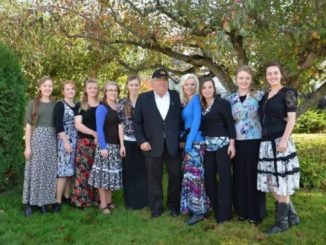
By Geordon Omand,
Winston Blackmore of Bountiful is accused of having two dozen wives over a 25-year period. The legal fight dates back to the early 1990s when police first investigated allegations that residents of an isolated religious community were practicing multiple or “celestial” marriages.
A lack of clarity around Canada’s polygamy laws led to failed attempts at prosecuting Blackmore, followed by several efforts to clarify the legislation, including a reference question to the B.C. Supreme Court. The court ruled in 2011 that laws banning polygamy were constitutional and did not violate religious freedoms guaranteed in the Charter of Rights and Freedoms.
Blackmore is not the only Bountiful-area resident who has been charged. James Oler will face trial alongside Blackmore for allegedly marrying four women between 1993 and 2009.
None of the allegations have been proven in court and the case is being heard by judge alone.
Oler was appointed to lead Bountiful following Blackmore’s excommunication from the Mormon splinter group in 2002 by Warren Jeffs, head prophet of the U.S.-based Fundamentalist Church of Jesus Christ of Latter-day Saints.
Last week, Justice Sheri Ann Donegan of the B.C. Supreme Court dismissed a request from Blackmore’s lawyer, Blair Suffredine, to hold separate trials for Blackmore and Oler.
Suffredine argued the polygamy charges involve separate and different allegations. If tried together, evidence against Oler could be prejudicial to Blackmore and vice versa, he said.
Peter Wilson, a special prosecutor appointed by the provincial government, argued that expert evidence was going to be called from witnesses in the United States and that it wouldn’t make sense to have them come to Canada again for a second trial.
Donegan said she wanted to “balance the interests of the public and the accused” and was not persuaded that the trial needed to be separated. She is expected to give her full reasons for the decision before the trial begins Tuesday.
The trial in Cranbrook is expected to last several weeks.
Canadian law
Suffredine said in an interview there’s no question surrounding the validity of Canada’s polygamy laws, but rather whether his client is entitled to an exemption for religious reasons.
“The dilemma is this, put simply: If you went out and slept with 20 women and made kids with each one of them, but then ran away and didn’t pay for them, you would not have committed any crime,” he said.
“But if you go through a ceremony where you promise to live with her or look after her and the children all your life, now you’ve committed a crime.”
Oler doesn’t have a lawyer for the trial. An impartial adviser has been appointed to assist the court and provide balance.
Wilson declined to comment before the trial.
Source: cbc.ca





Be the first to comment